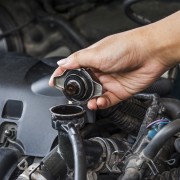As bad as a car that won't start can be, one that won't stop is far more dangerous. Keep a careful look out for these potential signs of auto brake problems.
- Browse Categories
- All Tips
-
Home & Garden
- All
- Appliances
- Bathroom
- Cleaning
- Crafts
- Decorating
- Electrical
- Flooring
- Furniture
- Garage Door
- Gardening
- Green Living
- Heating
- Home Alarm Systems
- Home Maintenance
- Home Remedies
- Home Security
- Home Staging
- House Sitting
- Junk Removal
- Kitchen
- Lawn Care
- Lock Systems
- Moving
- Outdoor Living
- Pest Control
- Plumbing
- Renovation
- Roofing
- Snow Removal
- Storage
- Tools
- Tree Service
- Health
- Family
- Travel
- Auto
- More Tips

Stop dangerous auto brake problems by looking out for these signs
October 13, 2014

Of the things that can fail on your car, brakes can have the direst consequences. Should ever you encounter any of the signs below, it’s wise to get your car into an auto repair shop to make sure everything is safe – before a small problem becomes a life-threatening one.
So what are the signs?
Is your brake warning light on?
This is obvious but needs to be said: If your brake warning light comes on, then you have a brake problem.
- This is often caused by low brake fluid, in which case you can try adding more yourself. However, it could also be a leak in the brake line.
- If your anti-lock brake system (ABS) light comes on, then you may have problems with this system. If the ABS stops working, your brakes won’t be affected but you’ll need to get the problem fixed.
Do you press mush?
Does your brake pedal feel spongy when you press down? Or to make the car stop, do you have to press down further than you used to?
- Perhaps there’s air in your brake system or your brake fluid is low. Maybe your brake pads are wearing down.
Watch out, soft brake pedals can be the first stop on the way to serious braking issues!
Do your brakes make strange noises?
Screeching, grinding, squealing, scraping, and other attention-getting noises could be a sign that the brake pads and shoes should be inspected and possibly replaced.
- Of these noises, grinding may be the most serious, indicating something metallic is scraping against a rotor.
- If you wait too long to fix this, your rotors could get warped and ruined from the metal-on-metal rubbing. Replacing pads and rotors is an expensive job.
Does your car pull to one side or the other?
When you apply your brakes hard, does your car pull to one side or shudder? If so, it’s a sign of excessive wear.
- On vehicles with front-disc brakes, the problem could be caused by a seized caliper or leaking brake fluid.
Other key questions
Other things to ask yourself include:
- Does the vehicle take longer to stop than it used to?
- Does the brake pedal pulsate up and down when I stop suddenly?
- Do I detect strong burning smells from my car’s tires?
If you answered yes to any of the above, for safety's sake it's time to take your car in for a brake inspection.






